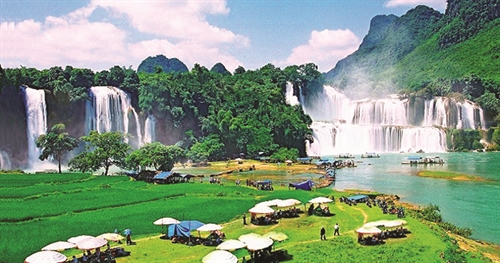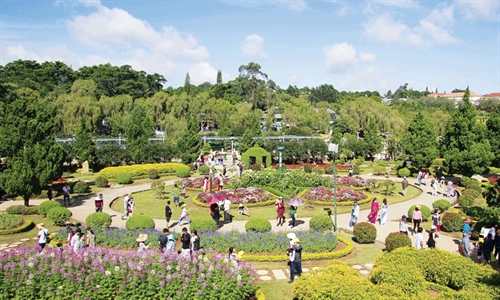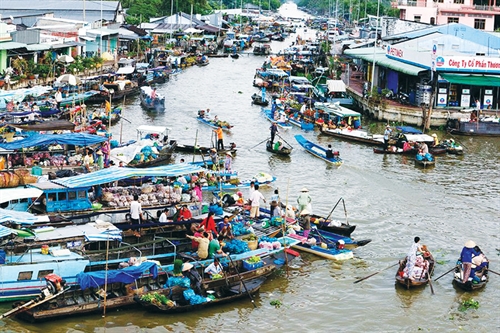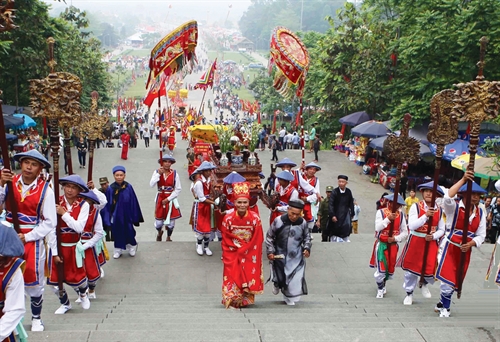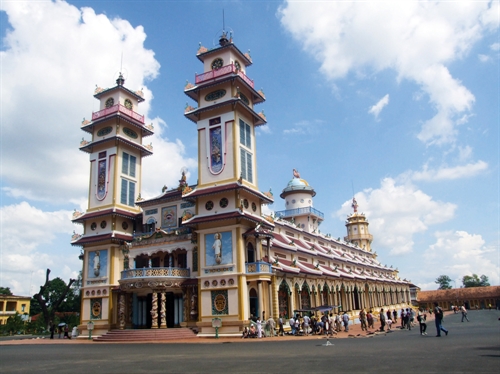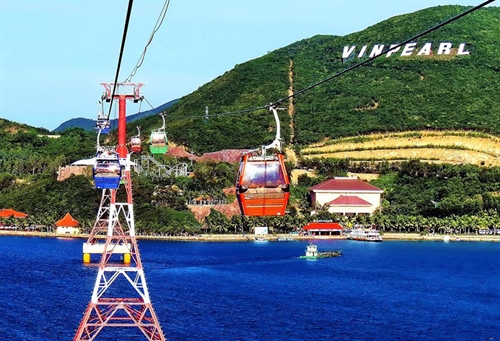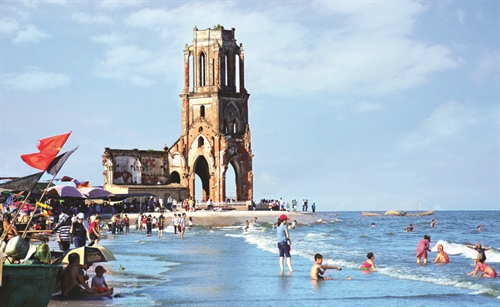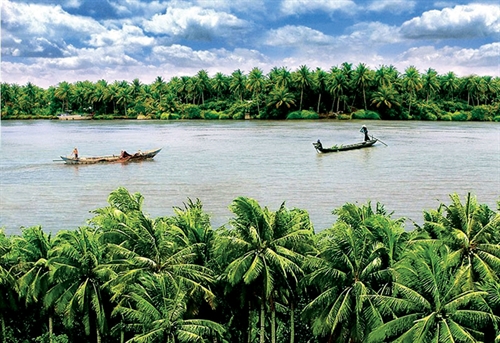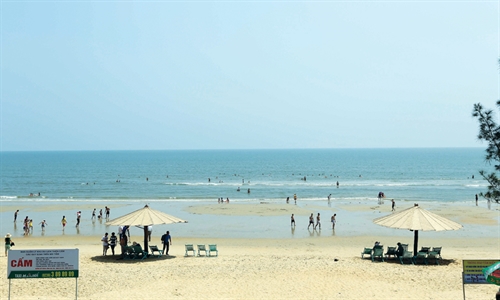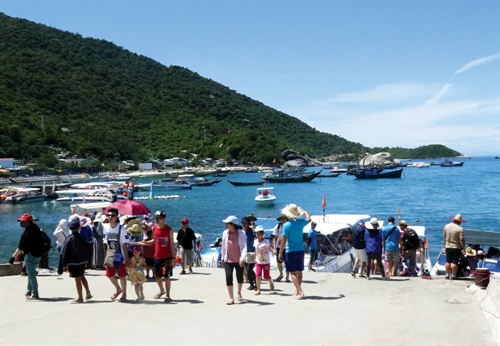Located in the Mekong River delta, Bac Lieu province borders Hau Giang and Kien Giang provinces to the north, Soc Trang province to the east, Ca Mau province to the west and the East Sea to the east. Covering 2,570 square kilometers, Bac Lieu has a population of some 892,900 and is home to three major ethnic groups, namely Kinh (Viet), Hoa and Khmer. Bac Lieu ranks seventh in terms of area and 11th in population among twelve Mekong River delta provinces. The province boasts a dense network of canals running into Ganh Hao, My Thanh, and Ba Thac (also called Hau or Hau Giang rivers). It has a provincial city with the same name, Gia Rai town and five districts of Hong Dan, Phuoc Long, Vinh Loi, Dong Hai and Hoa Binh. With a 56km-long coastline and a stable wind power source, Bac Lieu has big potential for the development of renewable energies, sea economy and tourism.
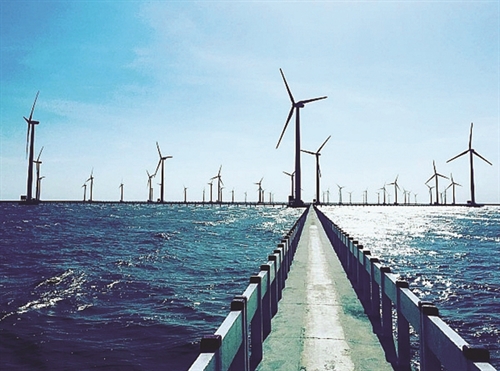 |
| Giant wind turbines in Vinh Trach Dong commune, 20 km away from the center of Bac Lieu city__Photo: Internet |
Land of shrimp farms and wind mills
Bac Lieu province is calling for foreign investment in the following five socio-economic development pillars: • Hi-tech agriculture; • Renewable energies, including wind, solar and gas-fueled power; • Tourism; • Trade, services, high-quality education and medical care; and, • Sea economy associated with assurance of national defense and security. |
Bac Lieu is connected with Soc Trang and Ca Mau provinces by national highway 1A, and with Hau Giang and Ca Mau provinces by Quan Lo-Phung Hiep road. Southern Hau river road also runs through the province. At present, it has no railway line or airport.
Bac Lieu boasts 164.7km of waterways with five routes ideal for tourism development, including 46km-long Quan Lo-Phung Hiep and 66.5km-long Bac Lieu-Ca Mau canal routes, and 24km-long Ho Phong-Ganh Hao river route.
At present, Bac Lieu province accommodates two industrial parks and three industrial clusters and six hi-tech shrimp-farming enterprises.
According to Pham Van Cong Luan, head of the Bac Lieu Planning and Investment Department’s External Economy Division, the province has granted an investment license to the third phase of the Thai-invested Bac Lieu wind power plant project capitalized at over USD 365 million. Under the project of the Super Wind Energy Cong Ly Bac Lieu Joint-Stock Company, which is by far the largest investor in the province established under the cooperation between the Cong Ly Construction-Trade-Service Co. Ltd., and Thailand’s Super Energy Corporation, 71 turbines with a total capacity of 142 MW will be installed in Vinh Trach Dong commune, Bac Lieu city. This year, Bac Lieu also permitted two existing projects, a garment project invested by the Republic of Korea (RoK) and a shrimp farming project invested by Thailand, to add USD 17 million to their registered investment capital.
The province currently houses 11 FDI projects from Australia, Japan, the Philippines, the RoK, Chinese Taipei and Thailand which have a total capital of around USD 440 million and are specialized in wind power, aquaculture, seafood processing and textile and apparel.
The Delta Offshore Energy Pte. Ltd of Singapore are among partners that have signed a memorandum of understanding on investment cooperation on a liquefied natural gas (LNG)-fueled power project with the Bac Lieu People’s Committee. The USD 4 billion project, the biggest of its kind in the Mekong River delta, will occupy an area of 100 hectares with a total output of 3,200 MW.
Chairman of Bac Lieu People’s Committee Duong Thanh Trung has pledged to create favorable conditions for investors and international organizations to directly meet and talk with the provincial administration and relevant agencies.
Director of the Bac Lieu Planning and Investment Department Tran Thanh Tam has told the press that the department would introduce Bac Lieu’s potential and economic strengths at direct dialogues with investors and via foreign consulates general in the country. The department would review licensed projects and help remove difficulties for investors, he added.
Bac Lieu will soon complete socio-economic infrastructure facilities to serve investment projects. It will continue applying the highest incentive policies for foreign investors, put into operation the provincial public administration center linked with the district- and commune-level centers and set up a hotline for provincial leaders to monitor the implementation of investment and business procedures in the province.
In addition, the province will publicize its socio-economic development orientations and plans, potential, strengths and investment policies in the mass media, departments’ websites, central magazines, forums and seminars.
At present, in addition to the Government-provided incentives, the provincial administration has offered investors with numerous incentives. Regarding taxation, new investment projects in areas with extreme socio-economic difficulties, in environmental protection or production (except those manufacturing products subject to excise tax and mining projects) are entitled to a 10-percent corporate income tax rate for 15 years. Projects building infrastructure of industrial parks, economic zones, export processing zones or hi-tech parks will enjoy corporate income tax or land rental reduction and exemption.
Cradle of “don ca tai tu”
Bac Lieu province is well-known as the cradle of “don ca tai tu” (southern folk music and songs), the musical art of southern Vietnam recognized by UNESCO as an intangible cultural heritage, and for the song “Da co hoai lang” (Night drumbeats for the absent husband) that was composed in 1919 by Cao Van Lau, a native of the province, and tells of the love, anguish and pride of a young woman who awaits her husband’s return from the battlefield as she listens to the sounds of war drums.
The province has 385-ha bird sanctuary in Hiep Thanh commune, Bac Lieu city, which is home to 46 bird species, and many orchards of longans, planted hundreds of years ago, covering 230ha in Hiep Thanh and Vinh Trach Dong communes, Bac Lieu city.
Other cultural and religious destinations include the ancient Vinh Hung temple - an architecture of Oc Eo culture, in Vinh Hung commune, Vinh Loi district; Phuoc Duc (or Bang) pagoda, the oldest one of Hoa people in Bac Lieu city; the 130-year-old Kom Phi Sakor Prekchou (or Xiem Can) pagoda built by the Khmer inspired by Angkor architecture, and the conical hat-shaped Cao Van Lau theater and Nha Mat tourist site with an 11-meter-tall Quan Am Bo Tat (Avalokiteśvara Bodhisattva) statute in Bac Lieu city.
Bac Lieu is also home to various festivals such as Nghinh Ong festival, which shows fishermen’s respect for the whale and gratitude for a bumper catch; the Khmer’s Ok Om Bok festival or festival of worshipping the Moon; and Da co hoai lang festival.
The province has three three-star, seven two-star and 20 one-star hotels.
If recognized by the Vietnam National Administration of Tourism, the New Palace Hotel will become the first five-star one in the province.
According to Ly Vy Trieu Duong, head of the Bac Lieu Culture, Sports and Tourism Department’s Tourism Management Division, Bac Lieu welcomed around 6.6 million tourists, including 200,000 foreigners, during 2011-17, with a year-on-year increase of 10 percent.
However, the number of foreign tourists to the province remained modest though it saw a 2.3-fold increase over 2011 to 40,000 in 2017. Most of foreign tourists were from China, Chinese Taipei, the US, Australia and Japan.
Over the past years, the province printed books and maps and made DVDs to provide tourist information and introduce the locality and local people on provincial and city television and radio programs. The image of “hospitable, civilized and courteous” Bac Lieu people were also introduced at over 30 regional and national fairs.
In addition to close cooperation with the Mekong Delta Tourism Association, the province has so far signed tourism cooperation agreements with 34 provinces and cities nationwide.
The province expects to receive 1.8 million tourists and earn a turnover of some VND 1.6 trillion this year.
To promote tourism development - one of the province’s five socio-economic development pillars, apart from four current tours, namely Cong Tu Bac Lieu homeland, Ganh Hao fishing port, spiritual tour, and Bac Lieu - a cultural rendezvous, the hospitality sector is calling for investment in the Tac Say Church-Lap Dien bird sanctuary - Ganh Hao estuary tour as well as building restaurants, hotels, deluxe shopping centers, and culture and sports facilities.
The Ministry of Transport has recently agreed to permit the province to open Bac Lieu-Con Dao sea transport route.- (VLLF)
